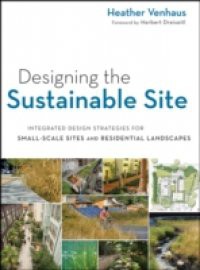The full-color, practical guide to designing sustainable residential landscapes and small-scale sites "Going green" is no longer a choice; it's a necessity. Developed landscapes have played a significant role in exacerbating the environmental and social problems that threaten humanity; however, they can also be part of the solution. Designing the Sustainable Site: Integrated Design Strategies for Small-Scale Sites and Residential Landscapes gives site designers and landscape architects the tools and information they need to become a driving force in the quest for sustainability. Advocating a regenerative design approach in which built landscapes sustain and restore vital ecological functions, this book guides readers through a design process for new and redeveloped sites that not only minimizes damage to the environment but also actively helps to repair it. Designing the Sustainable Site: Assists designers in identifying and incorporating sustainable practices that have the greatest positive impact on both the project and the surrounding community, within a regional context Uses photographs, sketches, and case studies to provide a comprehensive look at successful green landscape design Illustrates how sustainable practices are relevant and applicable to projects of any size or budget Demonstrates how built environments can protect and restore ecosystem services Explains the multiple and far-reaching benefits that sustainable design solutions can provide Assists project teams in fulfilling credit requirements of green building assessment tools, such as LEED, BREEAM, or SITES With attention to six global environmental challenges including air pollution, urban flooding and water pollution, water shortages, invasive species, and loss of biodiversity along with guidance on how to meet these challenges, Designing the Sustainable Site is a practical design manual for sustainable alternatives to small-scale site and residential landscape design.

